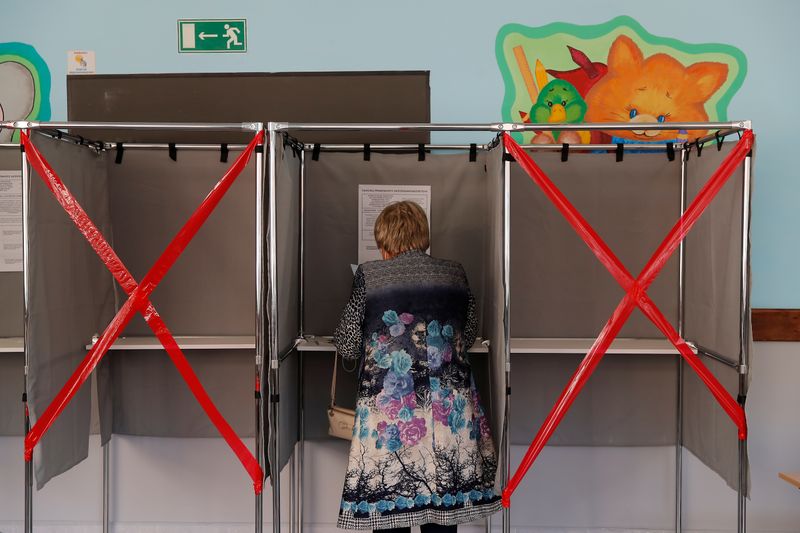By Tom Balmforth and Maria Tsvetkova
MOSCOW/TOMSK (Reuters) - The ruling United Russia party secured landslide wins at weekend regional elections but lost its majority in a Siberian city council contested by supporters of stricken Kremlin critic Alexei Navalny, partial results showed on Monday.
Supporters of the opposition politician, who is being treated in Berlin after a suspected poisoning by a nerve agent, made rare gains in the Siberian city of Tomsk and won seats in the city of Novosibirsk along with other opposition groups.
But pro-Kremlin politicians backed by President Vladimir Putin won, or were heading for landslide wins, to serve as the governors of more than a dozen regions including Komi, Tatarstan and Kamchatka, partial results showed.
They confirmed the overall dominance of United Russia, which supports Putin, but showed a perceptible uptick in opposition support in parts of Siberia where Navalny had focused his attention before the suspected poisoning on Aug. 20.
Germany said on Monday that laboratories in three countries had now confirmed the use of the Novichok nerve agent, and renewed its demand for an explanation from Russia. Moscow has called the accusation groundless and said it has seen no evidence.
Navalny had promoted a tactical voting strategy to challenge United Russia and disrupt a political system in which outspoken Kremlin critics are often barred from competing.
As he lay in hospital for the past several weeks, his allies pressed ahead with the strategy, naming more than 1,000 politicians they thought were well placed to beat ruling party candidates and urging Russians to vote for them.
In Tomsk, a vibrant student town that was Navalny's last campaign stop, at least 16 of those candidates won. United Russia secured no more than 11 out of 37 seats in the city council, partial results showed.
"People are sick of the authorities. You can't sit on the throne for 20 years, grab, steal endlessly, do all of this and go unpunished," said Ksenia Fadeyeva, one of two Navalny allies to win a council seat in Tomsk.
Navalny supporter Andrei Fateev, 32, also won a seat in Tomsk. Sergei Boyko, another ally of Navalny, won a seat on the council in Novosibirsk.
In that city, United Russia was heading for 22 out of 50 seats in the assembly, the Interfax news agency cited results as saying. It had held 33 seats.
But Dmitry Asantsev, a United Russia official, said three independents had joined the party's fraction in Novosibirsk giving it a slender majority there, the Moskovsky Komsomolets newspaper reported.
Elsewhere, United Russia looked to have maintained its grip on power and was on course to retain majorities in an array of regional legislative assemblies. Local elections took place in nearly all of Russia's regions.

The independent Golos election watchdog said it had received more than 1,000 complaints alleging violations at polling stations and that monitors had faced restrictions in their work.